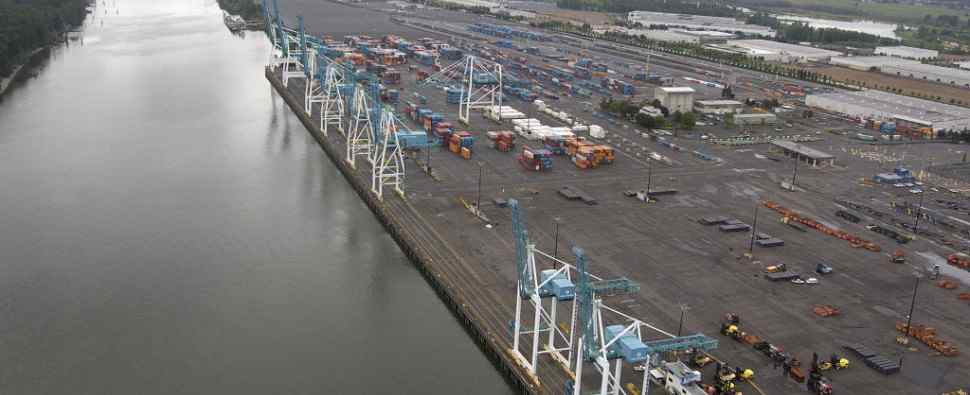forum
library
tutorial
contact

Farm Exporters Uncertain about
Portland Transload Facility
by Mateusz Perkowski
Capital Press, January 5, 2018
|
the film forum library tutorial contact |

|
Farm Exporters Uncertain about
by Mateusz Perkowski
|
The limited availability of containers is seen as a potential impediment for the Port of Portland's
newly opened rail transload facility, which is intended to help farm exporters.
 A new rail transload facility at the Port of Portland is intended to ease farm exports, but agricultural shippers say they are ambivalent about its chances of success.
A new rail transload facility at the Port of Portland is intended to ease farm exports, but agricultural shippers say they are ambivalent about its chances of success.
While a new option for getting hay and other goods across the Pacific Ocean is certainly welcome, farm exporters say they're still concerned by rail disruptions and container availability.
"Unless they're going to get us more containers, I don't think it's going to help," said Johnny Gilmour, a farmer and hay exporter with Gilmour Pacific near Albany, Ore.
Ocean carriers abandoned the port's Terminal 6 container facility in 2016 due to productivity slowdowns blamed on a labor dispute between ICTSI, the terminal operator, and the longshoremen's union.
The disruption was problematic because many Oregon farm exporters shipped their goods to Asian markets through Portland, rather than the more distant ports of Seattle and Tacoma along Washington's Puget Sound.
Port of Portland severed its contract with ICTSI last year and entered into an agreement with the International Longshore and Warehouse Union aimed at preventing future conflicts and promoting the facility.
Now, the port has opened a rail transload facility at Terminal 6 that will allow export containers to be transferred from trucks onto railcars headed for the Puget Sound.
For Oregon hay exporters, among the primary intended beneficiaries, the facility will allow truckers to deliver more than one container per day. Due to time constraints, truckers could typically only deliver a single container per day to Puget Sound ports.
Over time, the Port of Portland expects the transload facility -- operated in partnership with BNSF Railway -- will handle roughly 1,000 containers per week, with half of them headed for export markets.
"It will probably take up to a month or two to ramp up to a volume level like that," said Keith Leavitt, the port's chief commercial officer.
Incoming cargo will likely consist of finished wood products, tires and footwear, while outgoing goods will likely be hay and raw wood products, he said.
Leavitt said he's unaware of plans to ship value-added farm products in refrigerated containers, but the potential for such shipments exists.
"I don't see why that wouldn't be possible since we have that utility at T6," he said.
The transload facility will be open five days a week, providing better truck access that will improve the terminal's functionality, Leavitt said.
Late last year, the Swire Group agreed to send its ships to service the container facility, but these calls will only occur about once a month and focus on truck exports to Australia.
By keeping Terminal 6 operating throughout the work week, the facility will hopefully become attractive to other ocean carriers as well, Leavitt said.
"Connecting our cargo markets to the Puget Sound ports makes a lot of sense," he said.
Agricultural exporters say the new transload facility is probably meant to compete with Northwest Container Services, a private transload facility also in Portland. Capital Press was unable to reach the firm's Portland representative for comment.
However, the dependability of rail transportation to the Puget Sound has recently been questionable, said Jesse Bounds, a hay exporter with Bounds Hay Co. in Junction City, Ore.
Rail shipments of hay containers have sometimes been late to arrive at those ports, resulting in delayed arrivals in Asian markets and shipments getting split between two ships, which increases handling costs, he said.
"We've had problems with the rail and empty container availability," Bounds said, noting that the issues have kept him trucking containers straight to the Puget Sound.
The key to making Terminal 6's transload facility successful will be improving rail service and increasing the availability of empty containers, which are directly tied to the flow of imports, said Shauna Watts, co-founder of Lindsey Forwarders, which handles hay exports.
Another issue is the port's use of longshoremen, who have earned a reputation for being unreliable and expensive, she said.
"Competition makes everything work better, but it's ironic it's not necessarily better for the shippers," Watts said.
Related Sites:
Terminal 6 Business Study Executive Summary Advisian, January 2018
Related Pages:
Here's Why Portland Won't Get New Shipping Container Service Anytime Soon by James Cronin, Portland Business Journal, 5/9/16
learn more on topics covered in the film
see the video
read the script
learn the songs
discussion forum
